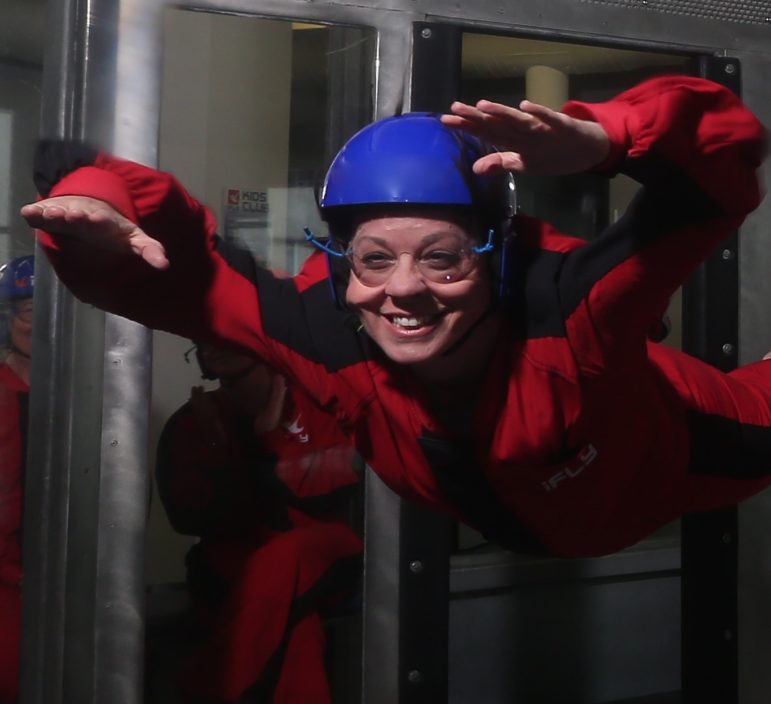 If you regularly work with traumatized children and youth, you will experience vicarious trauma. Full stop.
If you regularly work with traumatized children and youth, you will experience vicarious trauma. Full stop.
It’s not a question of if it’s going to happen, but when. The real question is — what will you do about it? Whether your role is director, program manager, advocate, counselor or office manager, you could experience negative thoughts, emotions and/or physical symptoms as a result of your work. These may come at you unexpectedly and may be crippling if you’re not prepared.
Working at Blue Sky Bridge, a child advocacy center, our team moves rapidly from one case of child abuse to the next and the next. Some of these cases are intense and can evoke feelings of sadness, anger or helplessness, and can trigger recall of something from our own lives. With many staff members exposed to trauma, vicarious trauma can spread throughout the organization.
If not dealt with properly, over time symptoms can become severe, leading to cynicism about work or other staff members, isolation (eating lunch at your desk, going out less, showing up late), mood swings, irritability, tearfulness, sleep changes or bad dreams, coping with food or alcohol, and more. On the team, it can lead to trust issues, changes in dynamics, stress and ultimately, staff turnover.
Thankfully, there is research and knowledge in the field on the symptoms and effects of vicarious trauma and the brain science behind it all. Those of us in helping professions have work to do to implement practices and procedures into our workday that will prevent and lessen the effects on the individuals and on the team.
Vicarious trauma symptoms occur when we fail to properly deal with exposure to trauma. If individuals and the team aren’t dealing with it, then the organization will suffer. I am no expert, but I do believe that we’re starting to get some things right at Blue Sky Bridge, mostly through a process of trial and error, and with lots of advice from experts in the field. Here are some tips that I hope will help you and your team in the journey to greater resiliency.
Self-care is part of your job.
It is our responsibility to take care of ourselves, and I don’t mean that in a trite sort of way. I literally mean that it is a part of every person’s job to make sure that they are sleeping, exercising, meditating, hanging out with friends and/or doing whatever it is they need to do to recharge and manage work and nonwork life. One person’s ability or inability to deal with their exposure to trauma will affect the entire team. So model behaviors for the rest of your team. Take that 10 extra minutes in the morning to practice some restorative breathing or go for that walk before you head home at the end of the day. Your brain, family and colleagues will thank you.
Of course, this is always easier said than done. We are so conditioned to feel guilt or weakness when we’re taking care of ourselves, perhaps because we’re always caring for the needs of others. (It feels unnatural.) Maybe you feel like you don’t deserve it, you have too much work to do or you don’t need help (“You’ve got this.”). Whatever your reasons, please acknowledge them as barriers and fight them proactively. Management can also play a role here, which I’ll discuss more.
Develop a personal self-care plan.
Developing a personal self-care plan relates to Tip No. 1, but it’s so important that it needs to be its own separate point here. Blue Sky Bridge staff members are encouraged to create their own personal self-care plan and communicate it to their supervisor. Why? Because we know from experience that if you don’t put it in writing and communicate it out loud, it will never happen. Make your strategies doable and if it’s hard for you, start small and build. Start doing something, however big or small. A great way to get started is to go through the Self-care Wheel created by Olga Phoenix, an expert in vicarious trauma prevention. Write down at least one thing in each part of the wheel to help you focus on each aspect of self-care. The key here is to set yourself up for success, so whatever you choose, make sure it’s realistic for you.
Create a culture of self-care in the workplace.
This point is especially true for management, but all staff can contribute to a self-care culture. Management’s role is to set the practices in place that prevent vicarious trauma and intervene when it presents itself. We accomplish this through our Resiliency Toolkit.
The toolkit includes everything the team needs to remain resilient. It’s an investment of time and energy, and it’s constantly changing because we all need different things at different times. The main features of the toolkit are our Staff Survival Guide, our Wellness Program, training opportunities, quarterly retreats, and everything and anything to make our work enjoyable. For example, last year we welcomed our facility dog, Marion, to our team.
 Marion came to us through Canine Companions for Independence. Her role working at Blue Sky Bridge is to help reduce stress and anxiety for children, families, staff and agency partners visiting the organization. Our team and partners seek out Marion after hard cases. We all experience her calming presence firsthand and cannot imagine our lives or our work without her.
Marion came to us through Canine Companions for Independence. Her role working at Blue Sky Bridge is to help reduce stress and anxiety for children, families, staff and agency partners visiting the organization. Our team and partners seek out Marion after hard cases. We all experience her calming presence firsthand and cannot imagine our lives or our work without her.
We developed our Staff Survival Guide for new employees, but it can be used by all staff. It introduces our core values, culture and challenges working at the organization. It also offers tips and resources to reduce stress during the workday. These include talking through difficult cases, using stress balls, taking walking breaks, using aromatherapy, coloring, tackling puzzles and much more.
The Wellness Program currently includes medical benefits for staff, a monthly stipend for gym membership or yoga classes, an outside therapist available anonymously to staff members and a facilitator to debrief with the team regularly. We offer many functional-area training opportunities to help the team get away from the day-to-day work and feel armed and empowered to help the children and families we serve.
Quarterly retreats may involve some work, but they are mostly play. Past retreats have included visiting an Escape Room, equine therapy, a spa day, a painting class, a cooking class with the board and indoor skydiving.

FUN!
Let’s face it — we have the craziest jobs, and we spend more time at work each week than anywhere else. We need to have fun and find little ways to laugh and make our work enjoyable. It’s not a perk, but mandatory in order for us to maintain our sanity. The great thing about having fun at work is that the ideas are limitless. Here are a few that we like: surprise meal or treats after a case, potluck/themed lunches, last Friday of the month happy hour, office art time (Zendoodles and mandalas), music breaks, birthday celebrations, Secret Snowflake during the holidays, guided meditation, pizza party and more.
In order to be successful, we need to be resilient. Now breathe and take a cute puppy break.
Gina Maione Earles joined Blue Sky Bridge as executive director in 2012. She has extensive experience managing and working with numerous nonprofit and for profit organizations across the country, overseeing program and financial management, fundraising, communications, marketing, events, external relations, operations, and organizational dynamics. Gina also serves as treasurer of the Board of Directors for the Colorado Children’s Alliance.































